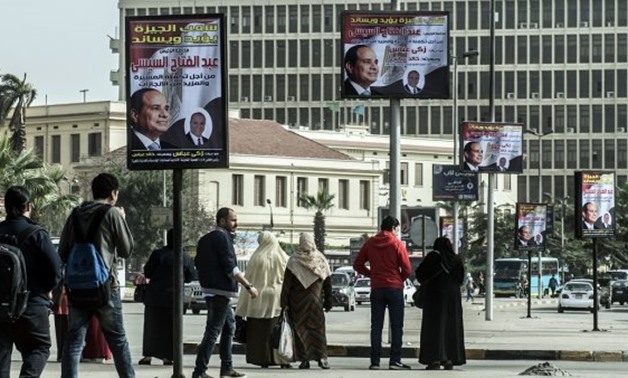
Khaled Desouki, AFP | An election campaign banner erected by supporters of Egyptian President is seen in the capital Cairo on February 26, 2018.
CAIRO – 8 May 2018: Political parties are preparing for the local government elections, slated to take place at the end of 2018 or the early beginnings of 2019, as announced by Speaker of the Parliament Ali Abdel Aal.
The Ministry of Local Development has reportedly allocated specific portions from its 2018/2019 budget to local councils, implying the government’s intention to permit municipal councils to work once again, MP Yousry al Asiouty, member of the parliamentary committee for local development, said in press remarks on Friday.
The local administration law will be expectedly passed during the current parliamentary session and then the government will be able to hold the municipal elections.
For his part, Yasser al-Hudaibi, official spokesman of the Wafd Party, said that the party is ready to run in the municipal elections, adding that the party is open to go in alliance with other parties and national forces to contest the elections in a mixed-party list under the leadership of the party.
Hudaibi added that Wafd preferred engaging other parties to form a political alliance as it is difficult for any party to win all the seats in all constituencies.
In the same context, Islam Ghazoli, member of the Political Bureau of Al Masryeen Al Ahrar (Liberal Egyptians Party), said that the party has been working on developing a comprehensive and ambitious strategy to prepare its cadres of young people and women to be able to actively participate in the municipal elections, stressing that the party seeks to empower fresh faces in the political scene.
Mohamed Amin, deputy chairman of the Conservative Party for Youth Affairs, pointed out that the party held several meetings to train its cadres in preparation for the local elections, stressing the need to expedite the issuance of the local administration law.
He pointed out that more meetings of the community dialogue should be held on the draft law to highlight the importance, impact and definition of the electoral system, stressing the importance of local administration in reducing the burden on the House of Representatives.
He explained that the Conservative Party is open to the electoral alliances in local council elections.
The local administration law stipulates that 75 percent of the seats shall be dedicated to the single-member seats, while 25 percent goes to the candidates of the winning mixed-party list.
Are municipal councils indispensable for development or corruption breeders?
In press statements, Wadhah al-Hamzawi, former governor of Sohag, said that the suspension of municipal councils has had a negative effect on governorates’ development because it had enabled the governors to easily implement development projects.
“The governor used to first come forward to the municipal council of his governorate before he could allocate any plots of land for investment purposes, and now he is obliged to present any development plans to the Cabinet during its meeting with the governorates, which lasts for only four hours,” he illustrated.
Hamzawi added that the governor may find himself not having the adequate time to discuss all aspects of the governorate’s development plan.
On the other hand, former Minister of Local Development, Ahmed Zaky Abdeen, said that the former local councils did not have an effective role in contributing to the development of the governorates.
“The problem boils down to the lack of experienced and qualified people in these councils,” he added.
Former Deputy Minister of Local Development Mohamed Attia told Tahrir News that the bribery charges unveiled by the Administrative Control Authority (ACA) is “just the tip of an iceberg”, stressing the need to form a body of law officers that can be entitled with overseeing the work of the municipal councils and that has the authority to immediately arrest corrupt officials.
From November 2017 to January 2018, the ACA managed to arrest several officials involved in bribery charges.
Following the 2011 revolution and the ouster of President Hosni Mubarak, municipal councils were dissolved, as their heads were unfairly elected during Mubarak’s era.


Comments
Leave a Comment